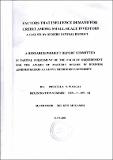Factors that Influence Demand for Credit among Small-Scale Investors. A Case Study of Meru Central District

View/
Date
2008-06Author
Wangai, Priscilla N.
Type
ThesisLanguage
enMetadata
Show full item recordAbstract
The recovery of the Kenyan economy that registered a steady growth rate of ranging between 0.5% in 2002, and 6.1 % in 2006 (CBS-GoK, 2007) reflected broad-based expansion of credit markets. This is demonstrated by the level of competition among credit lending institutions. Each institution is actively marketing their own tailor-made credit products that are targeting different needs of low income earners. However, despite the high supply of credit, MSE operators are still confining themselves to narrow market operations where competition is high and profits margins are low. The outcomes are being manifested in MSEs stagnating, retrogressing to micro status or closing up after few years of operation. Very few for instance are graduating to large enterprises. Using a sample survey data collected from Meru Central District, descriptive statistics and logistic regression models were employed to analyze factors that may influence demand for credit among the small-scale entrepreneurs. The study results show that education level of an entrepreneur, the number of dependents, and household income are significant factors that influence small-scale entrepreneurs to borrow credit from formal credit institutions. Demand for credit among women entrepreneurs in the MSE sector was found to be lower compared to their male counterparts. Based on these research findings, MSE operators can improve their participation in credit market by improving their business skills and knowledge plus maintaining proper accounting and book¬keeping systems. The .government needs to improve efficiency of DFis while at the same time facilitate participation of MSE operators in local and international trade fairs as a way to expose them to wider markets. To achieve gender balance on credit access from formal financial institutions, there is need to relax some of the cultural norms and allow women to have equal share of family assets so as to empower them in trade activities. This may call for government intervention.
Publisher
KeMU
